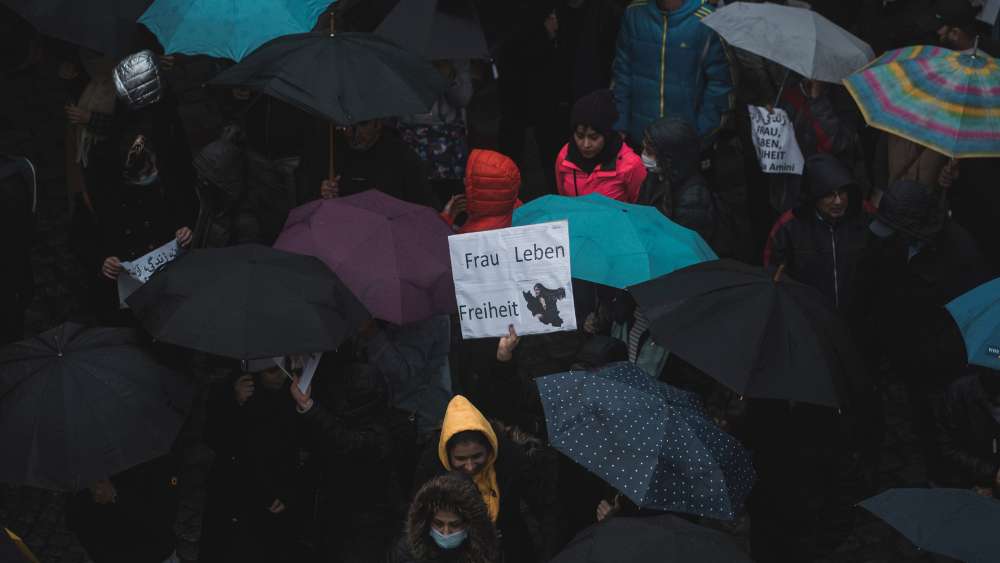To Realize a Feminist Foreign Policy, Germany Needs a New Approach to Security Sector Reform

(Bundeswehr/flickr)
Germany’s current approach to security sector reform is not compatible with the principles of a feminist foreign policy. To change that, the government must truly commit to human security and apply an intersectional lens.
Security sector reform (SSR) is a core element of Germany’s approach to stabilization abroad. International efforts to reform the police, military and other security institutions in conflict-ridden contexts such as Mali, Niger or Tunisia are meant to support these countries in achieving (or returning to) stability, in hopes that a more peaceful and secure European neighborhood will also assure Germany’s national peace and security. Germany’s decision to introduce a feminist foreign policy (FFP) now demands that the government rethinks these initiatives and assumptions from the perspective of the most vulnerable populations. Most fundamentally, it asks to prioritize gender equality and to transform violent systems of power. This paradigm shift, if fully embraced, raises some serious questions about how Germany has been approaching SSR so far.
Key points:
- A feminist perspective requires that the German government refocuses its approach to security sector reform on human security, specifically through a gender and intersectional lens.
- Germany’s SSR engagement needs to move beyond mere efforts of capacity building of security forces in partner countries and prioritize reforming security systems protecting the needs of the most vulnerable populations.
- To be a credible global advocate for a feminist approach to SSR, Germany needs to assess and confront the weaknesses of its own security forces.
FFP and SSR Have Human Security at Heart
In its 2019 SSR strategy, Germany recognizes that the core objective of SSR is to achieve human security. It holds that security is more than the absence of physical threats, namely the basis for safe, secure and decent livelihoods for all, including the most vulnerable populations. According to the strategy, SSR processes should create security forces that protect the population of a given state, rather than a regime or privileged groups. For this, the federal government recognizes, we also need to consider the gendered dimensions of (in)security: Efforts to address gender-based violence and discrimination, to increase the participation of women in security forces and SSR decision-making, and to improve accountability and oversight are understood as relevant to strengthening gender equality and to making SSR more effective.
From a feminist perspective, the federal government’s recognition of human security and especially its gendered dimensions seem like a steppingstone to pursue its SSR support under the FFP paradigm. Yet, Germany’s commitment on paper does not match its practice: It currently engages in Security Forces Assistance that caters to the security needs of the state, rather than supporting reforms that center on the security needs of the most vulnerable.
Capacity Building Alone Does Not Lead to Human Security
The federal government has been active in SSR since the early 2000s. However, instead of actually supporting reform, it focuses on building the capacity of partner countries’ security forces. But Security Forces Assistance (SFA) is not truly SSR: It does not tackle structural issues in the sector. The federal government’s flagship Enable and Enhance Initiative is a case in point. It largely centers on providing equipment and training without any structural ambitions. The overemphasis of capacity building also applies to the federal government’s engagement around gender and SSR: Focusing mostly on trainings and awareness raising among security forces in partner countries, Germany’s initiatives lack effort to transform the power structures that underpin violent and discriminatory behavior by security forces. This has long been criticized by researchers and practitioners, including gender experts, and a feminist perspective underlines the relevance of this criticism.
» A mere focus on capacity building and training cannot have the transformative effects necessary to achieve human security. «
The reason for Germany’s SFA focus is a flawed theory of change. The federal government supposes that the legitimacy of the state is a guarantor of stability and to achieve that impact, the capacity of security forces has to be increased. Yet, many of the issues facing the most vulnerable populations are deeply structural. Especially for women, ethnic minorities, and other marginalized groups in countries of German SSR engagement, the state, its police and military are the cause of insecurity rather than the remedy. LGBTIQ+ persons, for example, are at a particularly high risk of facing discrimination and abuse at the hand of security forces. This is due to deeply rooted, historically grown, patriarchal relationships between societies and their security forces. Therefore, a mere focus on capacity building and training cannot have the transformative effects necessary to achieve human security.
Furthermore, investments in building the capacity of security forces without efforts to also tackle structural issues run the risk of enhancing rather than addressing harmful practices. We see this in Mali right now, where the German government is struggling to find an adequate response to the atrocious behavior of the Malian army. Among other issues, the latter has reportedly inflicted large-scale violence on civilians and especially the marginalized ethnic group of Peul during its anti-terror operations, thus exacerbating the suffering of an already vulnerable population. Less than a year ago, Germany considered the same army a plausible source of stability even though it was already known for similar atrocities in the past. Berlin’s assumption was that if only Mali’s army were more professional, it would help return a functioning state.
Toward A New Way of Working on SSR
FFP now demands a fundamental shift in the federal government’s SSR engagement. Not the security needs of the state must be the concern behind assistance. It should be the security needs of the most vulnerable populations that are the main incentive for reforms. In practice, this would mean to place human security – specifically from a gendered and intersectional point of view – at the core of Berlin’s theory of change, and to devise solutions to this end. Capacity building may be a part of the answer, but it cannot be the only ingredient. For instance, it highlights that in order to increase women’s and marginalized groups’ representation in SSR decision-making, training has to go hand in hand with a change in discriminatory systems of power in security institutions, such as male-dominated work cultures. Similarly, efforts to provide access to security and justice for survivors of gender-based violence can only be truly transformative if all forms of gender-based violence, including against LGBTIQ+ persons, are recognized as punishable offenses.
Finding solutions to these structural issues requires a comprehensive reflection on how gendered power dynamics interact with other discriminatory structures in security systems, based on disability, ethnicity, sexual orientation, gender identity, or migration status. The federal government therefore must reconsider how it values and applies gender and intersectional expertise – especially that of feminist actors in partner countries. Together with them, Germany should look beyond the state-centered perspective, analyze the respective structural barriers to human security, and co-create locally appropriate answers to overcome them.
Rethinking Partnerships
In addition to a focus on human security, FFP also requires a critical reflection of colonial continuities. Not only is the idea of SSR a spawn of the ‘liberal peacebuilding’ school of thought, which promotes the model of a democratically governed security sector following a Western European blueprint (with so far limited success, as researchers have noted). But the fact that donors like Germany fund SSR activities in countries with tight state budgets also gives them significant agenda-setting power. Moreover, the sheer ambition to pursue a feminist foreign policy can be perceived as a form of Western hegemony, despite the crucial role that feminist activists in the Global South continuously play in shaping international feminist discourses and policy.
» Feminist Foreign Policy requires a critical reflection of colonial continuities. «
To find a way out of this dilemma, the German government needs to rethink the way it has been approaching partnerships in the context of SSR. The 2019 SSR strategy stipulates that Germany should not cooperate with partners that do not embrace the objective of reforms toward more democratic security governance. A first step toward a decolonial approach would be to replace the blueprint understanding of democratic governance with a joint commitment to human security. This would open up space to talk about local meanings of human security and context-specific solutions. This could be advantageous to foster dialogue with partners that increasingly scrutinize the engagement of Western democracies on their territory, such as Burkina Faso. Intergovernmental dialogue could focus on solutions that benefit the most vulnerable. Furthermore, the emphasis on human security would better recognize the trajectory that countries in systemic transition, like The Gambia, are undergoing.
This of course leaves us with the question what to do when a shared understanding of human security cannot be found with a partner country, as seems to be the case in Mali. In these instances, the federal government should live up to its own SSR strategy and walk away from the partnership – not only to stay true to its values, but because the engagement will be ineffective as long as it is not human security-centered. The toolbox of foreign policy is rich and other ways of cooperation exist. For instance, in Mali, Germany contributes to multilateral missions, pursues bilateral development cooperation and other stabilization projects. As long as there is no common ground to anchor SSR efforts in human security, these other initiatives should be sufficient, and they may even be a door opener to advocate for a feminist, transformative SSR in the future.
Transformation Has to Start at Home
Finally, to be a credible advocate for a feminist approach to SSR, the German government has to confront the weaknesses of its own security sector. Although the Bundeswehr has made an effort to attract more women, their overall proportion in the armed forces is still as low as 13 percent. And according to a recent study, the share of military personnel whose family has a history of migration is only at about 9 percent. Heteronormative understandings of masculinity and power, as just recently spotlighted by the case against a transgender lieutenant colonel, as well as right-wing extremism all fundamentally undermine efforts to counter discrimination within and by the German security forces. To address these issues, the federal government needs to move away from interpreting diversity and inclusion as the numerical share of diverse biographies in the security forces and instead strengthen efforts to address the underlying structures of discrimination. If Germany truly wants to promote gender equality and a feminist approach to SSR abroad, the transformation needs to start at home.
Franziska Ehlert
Doktorandin, Universität Freiburg
Johanna Schaefer-Kehnert
Senior Consultant, Syspons
Keep on reading

Wir machen keine feministische Außenpolitik, sollten wir aber
Feministische Außenpolitik bedeutet nicht einfach mehr Frauen in der Bundeswehr und an Verhandlungstischen. Die Bundesregierung muss Expertise über menschliche Sicherheit und Feminismus strukturell verankern.

National Security Means Addressing the Climate Crisis
When it comes to national security, the climate crisis is just as – if not more – threatening than traditional concerns like conflict and war. How can Germany embrace climate action?

How to Design a National Security Strategy with Peace in Mind
Germany’s security will be decided in the international arena and secured through transformative approaches to conflict resolution. To draft a successful and worthy strategy, Berlin will need to approach it with a global peace mindset.